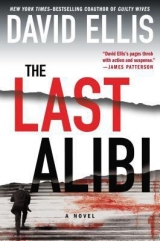
Текст книги "The Last Alibi"
Автор книги: David Ellis
Жанры:
Триллеры
,сообщить о нарушении
Текущая страница: 6 (всего у книги 31 страниц)
17.
Jason
Saturday, June 15
I wake with a start from a dream—dirt in my mouth, insects on my skin, my hands on the railing, trying to hold on but the gravitational pull is too strong—that quickly vaporizes into a mash of nonsense. I turn to Alexa, who has part of the bedspread pulled up over her. I am shivery, shaky, uneasy. I manage to make out the time on my watch: It’s past two in the morning.
I climb out of bed gingerly and find my pants. I dig into the pockets, but I don’t find them. That’s where they were, I’m sure of it, but they’re not there anymore. I try every pocket, patting them down, turning them inside out, but they aren’t there.
I gently pat the nightstand by the bed, almost knocking over the alarm clock, touching a sticky note, then something circular that is probably makeup. No. Not here.
I get down on my hands and knees on the hardwood floor and feel around. I check everywhere, picking up lint along the way, particles of sand from our beach walk, various other minuscule items you find on a floor.
I tiptoe outside the bedroom, close the door, and flip the switch in the nearby kitchen, squinting in the urine-colored light, retracing my steps from the front door. Nothing.
My head is echoing a gong now, my limbs twitching. I ease back into the bedroom and drop to my hands and knees again, repeating the same steps and expecting different results. I reach far under the bed, and my hand finds something small, granular—a mint from the Jurassic era—but otherwise nothing. “Shit,” I say, my hands moving wildly along the floor. “Shit, shit, shit.”
I hear a soft moan from the bed. Alexa rolls back over toward me and says, in a sleepy mumble, “Is everything okay?”
“Oh, yeah, sure,” I say quietly as I pull one leg through my pants. “But I need to get going. Somewhere I need to be tomorrow morning. I totally forgot.”
Alexa pushes herself up slowly. In the darkness, as far as my eyes have adjusted to it, she looks like she’s still climbing the ladder to wakefulness, peering at me with sleepy eyes. “You’re . . . leaving?”
“I have to. I’m sorry.”
She rubs her face. “Is it your knee?”
“No, nothing like that.” I sit on the bed next to her. “Let’s do something tomorrow. Okay?”
She pauses. I don’t know if she’s considering it or if she’s still half asleep.
“Call me tomorrow,” she says.
I press my lips to her forehead. “See you tomorrow,” I say. I throw on my clothes and head for the door. I go to the corner and try to hail a cab on Wadsworth, but there’s nothing here this time of night—I’m in a suburb, not the city—so I walk down a few more blocks to what passes for a downtown, a couple of banks and restaurants and a children’s store, and give it another few minutes. Finally, I call information on my phone, and after a couple of tries locate a company that will send a cab my way. I stand on the sidewalk, hopping on the balls of my feet, my thoughts careening wildly to dark subjects. A homeless man has taken up residence within the cocoon of a travel agency doorstep, a dingy SpongeBob SquarePants blanket over him, a skanky black beard obscuring his face. I can’t tell if he’s asleep or watching me, motionless.
A police squad car rolls down the street. I consider skulking into shadows, but they’ve already seen me. I’m committing no crime, but I can’t shake a feeling of something like guilt—but not guilt, not exactly, just a sense that I am wrong, that I am . . . not right. “Waiting for a cab,” I tell them when they slow the patrol car and roll down the window before moving on, after a curt appraisal.
Guilty, but not guilty. Wrong, not right.
I am wrong. I am not right. I am falling.
The cab arrives. I show the driver a hundred-dollar bill and tell him it’s his if we get home in twenty minutes. If there’s no traffic, the highway makes that a possibility. My knees bob up and down inside the sticky taxi, the cheap torn seating and the inane interviews from some entertainment show on the small video screen.
James Drinker is gutting women like fish and hiding behind me, the guy who isn’t supposed to say anything, isn’t allowed to say anything, would be punished for saying anything at all to anybody at all. I put my head between my knees and grit my teeth. My tongue is like a piece of damp fur, my breath putrid, my forehead slimy with sweat.
I throw the driver the money and push myself out of the cab. I run up to my door, get in, give the door a push before I bound up the stairs two at a time, all the way to the third story, and rush to the bathroom. I open the cabinet under the sink and find the box for the allergy medicine, a white box with an orange stripe.
I pull out the silver-foiled sheet and pop one of the pills out, chew it up, and fall to my haunches. I wipe sweat from my eyes and fall back against the wall, finally finding a gentle, warm place on my bathroom floor.
Relax, I tell myself. Everything’s fine. Just because Drinker is a weirdo doesn’t mean he’s a killer. You don’t have to do anything, and you can’t, anyway. And this other thing you’re dealing with—it’s going to be fine. You need to do something, but you will, you always have; you overcame Talia’s and Emily’s deaths, you overcame poverty and a fucked-up childhood, you can do anything you want, anything at all.
It’ll be fine, I promise myself as warmth spreads through me. It’s all going to be fine.
PEOPLE VS. JASON KOLARICH
TRIAL, DAY 1
Monday, December 9
18.
Shauna
Roger Ogren completes his opening statement at two-thirty. His presentation is what Jason predicted it would be: efficient, to the point, not flashy or hyperbolic. He is, according to Jason, a lifer at the office, a guy who interned during law school, started in traffic court when he got his law degree, and has spent nearly a quarter-century handling major felonies. I’ve struggled to guess what the upshot will be on drawing a veteran prosecutor. Has he fallen into bad habits that I can manipulate? Will he be wise to any tactical maneuvers we dream up? The best I can get from Jason, other than thoroughly unhelpful comments like “Roger is Roger,” is that Ogren puts on a straightforward case free of theatrics and imagination but may have the occasional blind spot for a creative defense attorney. (Now if I only knew a creative defense attorney—at least one who isn’t my client.)
Age has robbed Ogren of most of his hair and left it heavily grayed; cancer took away a good thirty pounds. Tall and thin and weathered, experienced and street-smart, careful and humorless—this is my adversary. I try to make it a habit to get along with opposing counsel, but then again, nearly every case I’ve ever tried was in the civil courts, where the dispute is over money, and where few of the attorneys have any illusions about their clients and sometimes are willing to share as much in off-the-record, colorful commentary. Prosecutors, however, are different. Their client is the state, the people, and many of them bring a holier-than-thou approach to their jobs. Defendants are the bad guys, criminals who must be incarcerated, and thus their attorneys, who search for dust to kick up or technicalities on which to seize, are likewise unsavory.
Judge Judith Bialek—“Judge Judy” behind her back—is a former prosecutor and a trial court judge going on eighteen years now. The bad news is she’s inclined toward the prosecution, the good news that Jason always did well in her courtroom when he was prosecuting felonies. I’ve noted a crimp in her expression from time to time when she’s looked over at Jason sitting in a chair that she probably never expected him to occupy.
“Ms. Tasker,” she booms to me, looking over her glasses, “does the defense still wish to reserve its opening statement?”
It’s been a debate between Jason and me all along. I want to deliver the opening statement now, to tell the jury, right now, right this second, before any impressions can cement in their minds, that Jason didn’t kill anybody. I’m a believer that many jurors make up their minds after opening statements, and if I hold back now, Roger Ogren gets out his first impression without me giving mine. Strike that—the defense is giving a first impression, but not a favorable one: We have something up our sleeve, something perhaps too clever by half, not a straightforward, just-the-facts presentation like our adversary. Roger Ogren has the facts, the defense has snake oil.
“We will reserve, yes, Judge,” I say, standing at my seat.
Jason, who wanted us to hold back our defense, won our internal debate. He might be right. On these matters, he usually is. But the truth, which I prefer not to confront, is that I went along with his idea because I was afraid of overruling him and then being wrong. That is something they don’t talk about in law school and something that attorneys in civil litigation rarely experience—the all-consuming fear that your mistake will land a client in prison.
The truth is that I’m absolutely terrified of making one of those mistakes.
19.
Jason
“It was the right decision,” I say to Shauna after Judge Bialek calls a recess following Roger Ogren’s opening statement. Over the last two weeks, she has argued fiercely for delivering the defense’s opening statement at the start of the case, as is tradition—so much so that she actually wrote and presented her opening statement to me two nights ago in an effort to change my mind. It was a great opening, well couched and expertly delivered, but she was never going to change my mind about this. There’s no way we’re telling the jury what happened yet. I know this more than Shauna does.
Because I know things my lawyer doesn’t.
Shauna looks at me, poker-faced. The jury hasn’t filtered out yet, and she doesn’t want to betray any reactions, any emotions, in front of them. Plus there is the gallery behind us, a plentiful group of reporters and onlookers, all of whom would be more than happy to send tweets or post online stories about a perceived “disharmony among the defense team” or “surprised reactions” from a lawyer or from me. I’ve been surprised at the media’s interest in this case, which owes primarily to the fact that many people believe that I was the private attorney who played a central role in the scandal that embroiled our last governor, Carlton Snow. I was, and I did. But I’ve never acknowledged it publicly. Shauna wanted me to do so now in a blatant attempt to influence the jury pool, to trumpet the work that I did for the federal government, to display me to the public as a whistle-blower on corruption, a do-gooder who helped stop bad people from doing bad things. From whistle-blower to accused murderer was how one of the local papers blazed it in a feature story, even without my saying anything.
“You doing okay? I didn’t think Ogren was that good. You doing okay?” This from Bradley John, the lone associate at our law firm, a young guy with a lot of talent and a terrific work ethic. If I could get him to cut his hair so he didn’t look like the lead singer in some cheesy boy band, he might have a future in this profession.
“Ogren was good,” I say. “He was what he needed to be.”
“There’s water if you want it,” he says, nudging the bottle toward me.
“Okay, thanks, kid.” I stifle a snicker and catch eyes with Shauna. Among the other tasks she has delegated to young Bradley, Shauna presumably has given him the assignment of babysitting me, making sure I never get dry mouth, never come suddenly unglued in the middle of a long day of trial.
When it was bad for me, when I was scraping the bottom this past summer, I would use the dry mouth I was experiencing as an excuse to reach for my tin of Altoids. My mouth is feeling kind of sticky and dry, better pop a mint! I even used the excuse when I was alone, as if I were somehow fooling myself with the ruse. You know your life is going off the rails when you tell yourself the lie you’ve created for everyone else, and you believe it.
And the ruse was no casual thing. I did research. I bought a dozen different brands of breath mints, brought them home and opened each container, examining each mint individually to identify the one that bore the closest resemblance to a thirty-milligram tablet of OxyContin.
I ended up going with Altoids, even though they weren’t the best replica, because when I’ve eaten mints in the past, it was usually that brand. Every morning, I replenished my Altoids tin with a half dozen new Oxy pills, enough for one every two hours of a workday and a couple extra in case I went straight from work to dinner. It became my top priority, ensuring a proper supply of OxyContin before I left the house.
Of course, I also needed to have real Altoids, in case someone saw me partaking and asked me for one. Hey, could I bum one of those off you? I couldn’t very well drop a tablet of immediate-release oxycodone into their hands, which would have given them a lot more than minty breath. So I always carried around two of the mini-tins, the red peppermint tin for the painkillers and the blue tin of wintergreen mints for curiously strong breath freshening. I lived with the nagging fear of making a mistake and handing a friend or colleague the wrong tin.
More ridiculously still, I went through the same routine at home, sticking a sleeve of the Oxy tablets in a box of allergy medicine, even though I’ve never been allergic to anything in my entire life. But just in case, on the off chance that I might have a female visitor to my house, again I needed a ruse for my painkiller habit. I remember driving to the pharmacy, looking for a box of allergy medicine for my disguise, and not even knowing what to say to the pharmacist, finally settling on hay fever because my mother used to have that problem in the summer.
“I’m doing fine,” I say to Bradley, making sure Shauna hears it, too. I am fine. It’s been over four months now, and I feel separation from the drugs. And I sure as hell am not going to come apart in front of my jury, who will scan me throughout the trial for any hint of emotional instability, among other things.
But the harshest truth I’ve ever had to accept is the one I swallowed a few months back: I lost control once, and I can’t ever be one hundred percent sure I won’t lose control again. I’m now an addict, and I’ll be one for the rest of my life.
The judge reenters the room, and everyone rises. The jury filters back into their assigned seats. In response to Judge Bialek, Roger Ogren rises.
“The People call Officer Martin Garvin,” he says.
20.
Shauna
Marty Garvin is a young cop, mid-twenties, with three years in uniform as a patrol officer. He looks more like an accountant, a bookish sort with a long nose that dominates his face. He is soft-spoken and careful with his words as he relates his background. It’s clear that he is not a veteran witness; he pauses before each answer, measuring his words, probably a bit too much for the liking of the jury. But I have to concede that he comes off as earnest and straightforward.
They start with the 911 call, which started this whole affair. Technically, Officer Garvin is not the one to authenticate this recording, but we stipulated to its admissibility rather than force the prosecution to drag in the 911 dispatcher. Sequentially, this is the first step in the story, and I don’t blame Roger Ogren for wanting to start with it.
The words echo through the silent courtroom, maybe the only words that the jury will ever hear directly from Jason’s mouth:
“There’s been a . . . death. Someone’s been . . . There’s been a murder. Please come . . . please come right away.”
On the tape, Jason’s voice is ambiguous. Shaky, but not distraught—not as distraught as I would have liked him to sound, but not nonchalant, either. Sad, maybe. Disturbed, but not unhinged. If you knew Jason, you could believe that this is him sounding upset, the stoic warrior trying to keep it together. The problem is, the jurors don’t know him. It is one of the many incongruities of the courtroom: People who are making a decision that could affect the rest of Jason’s life know him less than anybody he’s ever met.
The jurors listen with furrowed brows, some of their eyes closed, trying to envision the person delivering those words. The words of a distressed man? The words of a cold-blooded killer? My take is they could interpret this 911 call in whatever way necessary to suit their conclusions.
“I arrived just after midnight—I believe it was twelve-fifty A.M.—the first hour of July thirty-first,” says Garvin. “The defendant met me at the front door of his town house.”
The defendant, not Jason. Depersonalizing the adversary. Officer Garvin has been coached well.
“Describe what happened next, if you would, Officer.”
“The defendant led me upstairs to the second floor of his town house. He made me immediately aware of a Glock handgun that was lying on the floor next to a dead body in the living room. He said the weapon might be loaded, but he wasn’t sure.”
“Is this the weapon?” Ogren asks. From the evidence table behind the prosecution, Ogren removes the handgun. We have stipulated that this was the weapon Officer Garvin found at the scene. We have stipulated that it was the murder weapon.
And we have stipulated that, according to records filed with the state police, the owner of this handgun is Jason Kolarich.
Over the defense’s objection, which Judge Bialek already overruled prior to trial, Roger Ogren shows the officer a series of photographs laying out the scene on the second floor of Jason’s town house: the dead body with a single gunshot wound to the back of the neck, the handgun lying neatly nearby on the hardwood floor. Close-ups and faraway shots, angles capturing Jason’s kitchen and shots showing his large window overlooking the street, dark at that time of night.
“Once you determined that the victim was, in fact, deceased, and after securing the handgun, what did you do next, Officer?”
“I asked the defendant if anyone else was in the town house. He said no. I told him I wanted to search his person for other weapons, and he allowed me to do so. I found no weapons on his person. I asked the defendant for permission to search the remainder of the house, and he gave me that verbal consent. My partner, Officer Middleton, stayed with the defendant while I searched the remainder of the town house. I determined that nobody else was present in the house.”
“What happened next?”
“I read the defendant his Miranda rights and asked him if he could tell me what had happened.”
“And what—”
“He said he wanted to call his lawyer.”
“What did you do in response?”
“I ceased any questioning. I told him he was not under arrest and that it wasn’t the time for a phone call.”
That’s right. It wasn’t until nearly two hours later, at close to three in the morning, that Jason called me at my home. Three-oh-six in the morning, to be exact; I’ll always remember the time on the bedside clock. Shauna, he said to me, his voice calm but with a slight tremble, I’m being arrested for murder. Call Bradley John and have him meet me at Area Three.
Shauna, I’m being arrested for murder.
SHAUNA, I’M BEING—
“I radioed for detectives and tried to keep the scene as pristine as possible,” Garvin continues. “I directed the defendant to remain in the kitchen, where he sat in a chair while we waited for the police detectives. Detective Cromartie arrived about thirty, forty minutes later.”
Ogren pauses briefly for a segue. “Officer, can you describe the defendant’s demeanor during this encounter?”
Officer Garvin nods, ready for the question. “He was very compliant. He was able to speak clearly and intelligently. He seemed calm. No outbursts.”
“Was he crying?”
“No, sir. I didn’t see that.”
“Did he seem upset in any way?”
“Objection,” I say.
The judge allows the question. I scold myself for the objection. I’ve just highlighted the testimony, placed more importance on it. And since I did object, I should have at least done a speaking objection: The officer couldn’t possibly know if my client was upset, Judge.
Shit. That was a mistake. An easy one I fumbled. Get your head in the game, Tasker. This is the whole ball of wax.
“The defendant showed no outward signs of any emotion,” says Garvin. “He wasn’t happy, but he wasn’t crying or shouting or moving. He was calm and quiet.”
“Thank you, Officer.” Ogren nods to Judge Bialek. “No further questions.”








